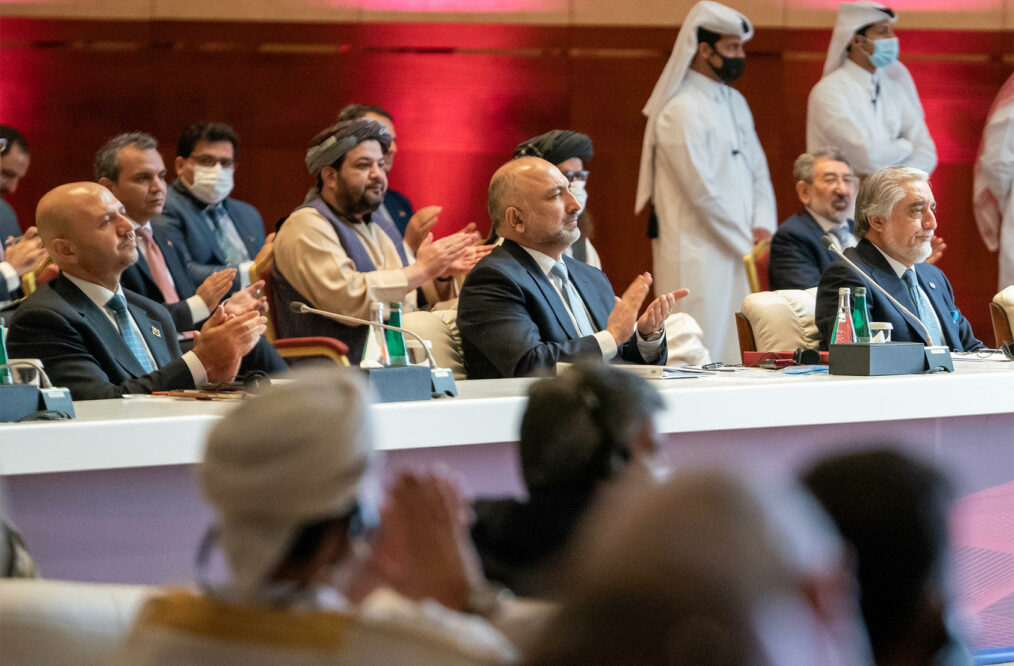
Afghan Peace Talks: Interests and Uncertainties
It has been more than a month since inter-Afghan negotiations started in Doha, Qatar. Within this period, they have come close to an agreement on procedural rules and this is important as direct negotiation will commence once both parties agree on a framework at the negotiation table.
Right now, two disputed articles are a source of dispute resolution during negotiations and highlight the relevance of the United States-Taliban agreement. The Taliban want Hanafi Fiqh to be the only source for dispute resolutions and insist that the US-Taliban agreement should be treated as the ‘mother deal’.
Progress in negotiations, however slow, is obvious. It may take time but there are hopes among both parties that an agreement can be reached. Yet, reaching an agreement will not be the end of the road. The Taliban have failed to deliver on their promise of reducing violence. Recently, the US military targeted Taliban strongholds in Helmand province stating that their actions have not been consistent with the deal. This is not a large-scale conflict, but it indicates that the Taliban are not honest about their agreement with the US. It would be hard, therefore, to be optimistic about their honesty with the Afghan government if an agreement is reached.
Recently Amrullah Saleh, the first vice president of Afghanistan, reemphasized that the Taliban are a terrorist group based in, and supported by, Pakistan. He foresaid with confidence that the Taliban would melt in the society after a peace agreement and would soon have no public support at all. This may not be 100% accurate, but it signifies an important point about the interests of the negotiating parties. The Taliban understand that they can well secure their interests and goals through war, extremism, terror, and tyranny.
The Afghanistan government, on the other hand, knows that they win through peace, democracy, and ensuring civil and political liberties. Peace for the Taliban would mean giving up on their key means of coming to power (i.e. war) as gaining power through democratic institutions seems very unlikely for them not to say that it is against their religious systems of governance and liberties. This makes reaching an agreement hard if not impossible.
Both parties will need to meet in an intersection where their interests overlap. Perhaps, this could be achieved through a balance in political and military power which is more easily said than done. If forced to a political settlement, the Taliban would definitely propose special structures of governance to ensure they remain in power later on.
The US approach to bringing the Taliban to the negotiation table has probably intensified problems. Now, they have a deal with the US and have had 5000 prisoners released. Yet, they have not reduced violence in spite of their participation in the negotiations with the Afghan government. Apparently, the Taliban are misusing US diplomacy as well as the fact that the Afghan government has failed to bring all political parties under a united umbrella. Currently, the leading political parties such as Jamiat-e-Islami, led by the former foreign minister Salahuddin Rabbani, Junbush-e-Milli led by Marshal Dostum, and Hezb-e-Islami led by Gulbuddin Hekmatyar, are the government oppositions after the controversial results of the 2020 presidential elections.
An alternative approach would have been regional pressure on the Taliban as well as increasing military attacks on them temporarily in order to force them to negotiate. Such an approach could have signaled to the Taliban that war is not their dominant strategy and their only option would be giving in to a political settlement. Particularly, international pressure on Pakistan to dismantle Taliban headquarters (especially the Quetta Shura) in its land would have been fundamentally effective. However, Pakistan has been a resort to all terrorist groups in Afghanistan and despite the fact that bin Laden was killed in this country, the US and international community have never exerted enough pressure on this country to take effective measures against these groups.
Pakistan could, at the very least, bring its ‘boys’ to negotiations with lower demands if this approach was used. Some analysts believe, though, that the US war against the Taliban is a sheer waste of time and resources. They argue that the US has no interest in Afghanistan anymore as the main goal of eliminating Al-Qaeda has already been achieved. They believe this is not a US war but the continuation of a civil war that started after the coup for the presidency in the 70s and, therefore, should be left to the Afghans themselves to resolve it.
One important aspect of the uncertainties is associated with ethnic and religious complexities in Afghanistan. Some analysts have highlighted the Pashtun ethnic basis of the Taliban movement as they emerged to fight a non-Pashtun government/leadership after the war against the Soviet Union. Some Pashtun elites referred to that transfer of power as the decline of the Pashtuns back then and believed it was more significant than the defeat of communism. That was probably a reason that the Taliban gained public support among the majority of Pashtuns back in 1996 and fought the resistance groups mainly consisting of non-Pashtun ethnicities. Circumstances might have changed but the complexities are still in place.
Another issue would be religious jurisdictions. As noted before, the Taliban insist on using the Sunni-Hanafi sect as the source of solving disputes in the negotiations. One can hardly predict that they accept the Shia sect, in which almost all Hazaras believe when it comes to laws and dispute resolution in the country. Considering all these diversities, some politicians from the former resistance groups (against the Taliban) ask for reforms in the political structure and believe that a decentralized system would have the capacity to include all in the future.
Prospects seem unclear at this point but time will clear uncertainties as the negotiations start. If resulting in peace, the negotiations will be an unprecedented success in the history of Afghanistan.
